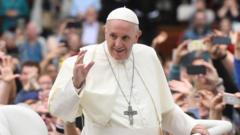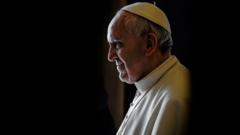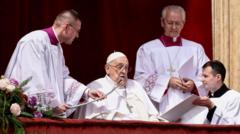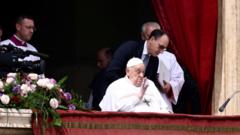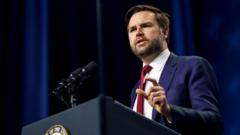In a pivotal moment for the Catholic Church, Pope Francis leaves behind a legacy of inclusivity, challenging cardinals to evaluate the future direction of the papacy.
Pope Francis: A Legacy of Inclusivity and Reform in a Changing Church

Pope Francis: A Legacy of Inclusivity and Reform in a Changing Church
As Pope Francis' tenure unfolds, the cardinals must choose between a welcoming church and a return to tradition.
April 21, 2025, marks a significant turn for the Roman Catholic Church as cardinals prepare to elect a new pope after Francis. His leadership has sparked critical dialogue on whether they will embrace his vision for a church that is welcoming and globally engaged or revert to the more traditional, doctrinaire stance of previous leaders.
The legacy of Pope Francis is complex and multifaceted. While he ignited hope for revitalization, the anticipated "Francis effect" to reinvigorate church attendance has largely fallen flat, particularly in the secularized West. Nevertheless, attendance has seen a surge in the global South, reflecting a nuanced landscape of faith.
Francis tackled pressing issues, such as the church’s historical sexual abuse scandal and its opaque financial practices. His advocacy for discussions on contentious topics—like divorce, the roles of women, and acceptance of same-sex couples—has delighted progressive Catholics after a long period of conservative papacies. However, critics assert that he merely set the stage for future debates, cautioning that an unyielding successor could reverse these dialogues.
In stark contrast to his predecessors, Benedict XVI and John Paul II, Francis sought to combat negligence regarding sexual abuse within the church. While John Paul II gained sainthood, his legacy took a hit following a Vatican report highlighting his inadequate response to abuse allegations. Francis, in contrast, emphasized open dialogue and the inclusion of diverse views in a historically rigid institution.
Furthermore, he proactively engaged with the Muslim community as a means of fostering peace, especially in areas where Christians face adversity. This outreach was paramount, especially after controversial remarks by Benedict that inflamed tensions.
Importantly, Francis revamped the hierarchy of the church, appointing a significant number of bishops and shaping the College of Cardinals to prioritize his vision of social justice, climate advocacy, and compassion for the marginalized.
As Pope Francis transitions into a new chapter, the future of the Catholic Church rests in the hands of cardinals tasked with determining its next steps—whether to continue the progressive trajectory he initiated or return to past conservativism.
Jason Horowitz contributes to this analysis as the Rome bureau chief for The Times, offering insights into the implications for Italy, the Vatican, and beyond.
The legacy of Pope Francis is complex and multifaceted. While he ignited hope for revitalization, the anticipated "Francis effect" to reinvigorate church attendance has largely fallen flat, particularly in the secularized West. Nevertheless, attendance has seen a surge in the global South, reflecting a nuanced landscape of faith.
Francis tackled pressing issues, such as the church’s historical sexual abuse scandal and its opaque financial practices. His advocacy for discussions on contentious topics—like divorce, the roles of women, and acceptance of same-sex couples—has delighted progressive Catholics after a long period of conservative papacies. However, critics assert that he merely set the stage for future debates, cautioning that an unyielding successor could reverse these dialogues.
In stark contrast to his predecessors, Benedict XVI and John Paul II, Francis sought to combat negligence regarding sexual abuse within the church. While John Paul II gained sainthood, his legacy took a hit following a Vatican report highlighting his inadequate response to abuse allegations. Francis, in contrast, emphasized open dialogue and the inclusion of diverse views in a historically rigid institution.
Furthermore, he proactively engaged with the Muslim community as a means of fostering peace, especially in areas where Christians face adversity. This outreach was paramount, especially after controversial remarks by Benedict that inflamed tensions.
Importantly, Francis revamped the hierarchy of the church, appointing a significant number of bishops and shaping the College of Cardinals to prioritize his vision of social justice, climate advocacy, and compassion for the marginalized.
As Pope Francis transitions into a new chapter, the future of the Catholic Church rests in the hands of cardinals tasked with determining its next steps—whether to continue the progressive trajectory he initiated or return to past conservativism.
Jason Horowitz contributes to this analysis as the Rome bureau chief for The Times, offering insights into the implications for Italy, the Vatican, and beyond.









